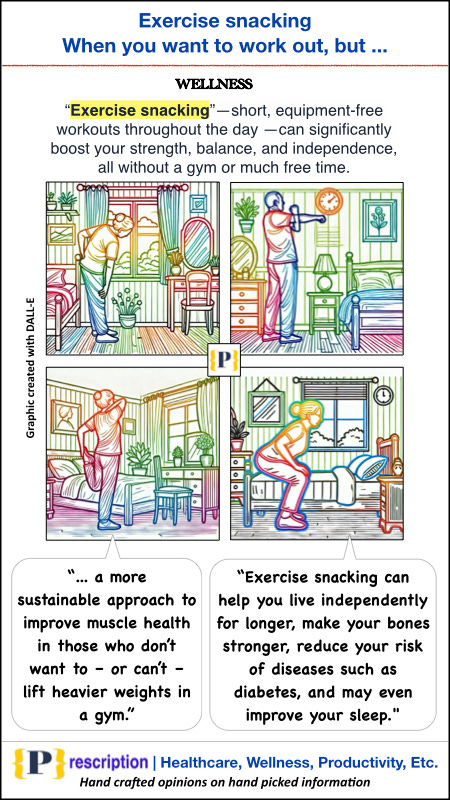Exercise snacking - when you want to work out, but ...
Taking it in small bites does the trick for those who shirk from commitment to long sessions of exercise.
Sitting is the new smoking. Being a couch potato is as dangerous as smoking.
Everyone needs exercise. There is no argument about that. Every week, 150 minutes or more of moderate physical activity should be the goal.
I know, but...
Excuses, galore; here's a shortlist:
Lack of time: Busy schedules are a primary reason for not exercising.
Lack of motivation: Many people find it hard to start and maintain a consistent exercise routine.
Social anxiety: Fear of being judged or embarrassed while exercising in public can be a significant barrier, especially among individuals with high social anxiety.
Low self-esteem and body image issues: Body dissatisfaction and low self-esteem can lead to exercise avoidance due to feelings of embarrassment and discomfort.
Perceived lack of skill: Some individuals feel they lack the necessary skills or knowledge to perform exercises correctly.
Physical fatigue: Chronic fatigue or the physical demands of daily life can make the prospect of additional physical activity seem overwhelming.
Cost and accessibility: The perceived cost of gym memberships, exercise equipment, or even appropriate workout attire can be a deterrent for some people.
Lack of enjoyment: Many individuals just do not find exercise enjoyable.
But everyone loves snacks
Exercise snacking is defined as short, isolated bouts of physical activity performed periodically throughout the day. These "snacks" typically last a few minutes and involve vigorous exercise aimed at improving health outcomes efficiently.
Not just a fad
There is scientific proof that exercise snacks are beneficial.
Cardiometabolic health: Exercise snacking improves cardiorespiratory fitness and reduces the impact of sedentary behaviour.
Blood sugar control: In Type II diabetics (the common variety seen in adults), exercise snacks before meals improves blood glucose control compared to traditional continuous exercise.
Muscle function in older adults: Older adults who performed exercise snacks showed improvements in leg strength and muscle size.
Physical function in prefrail, older adults: Initial findings suggest potential benefits for maintaining physical function.
Snack size: how long and how often?
Duration: Each exercise bout or "snack" should be around 2–5 minutes.
Frequency: 3-6 times a day. Studies have shown that eating exercise snacks, especially 30 minutes or so before meals, has benefits.
No excuses
This approach of short, frequent bursts of exercise can be easily integrated into daily routines provides significant health benefits without requiring a large time commitment.
Snack menu
Here's a "daily dozen" of choices to suit your snack palate. No equipment needed; you can do these in your bedroom.
The long list of excuses goes out of the window.
High Knees: Running in place with knees lifted high to engage the core and leg muscles.
Lunges: You can target your legs and glutes by doing this while stationary or walking.
Planks: Hold for 30 seconds to a minute to engage the core.
Sit-to-stand: From a seated position, stand up and sit back down repeatedly to work the lower body.
Step-ups: Use a sturdy chair or step to alternate stepping up and down, engaging the legs and glutes.
Arm circles: Extend arms out to the sides and make small circles to warm up the shoulder muscles.
Tricep sips: Using a chair or bench, lower and lift your body to work the triceps.
Wall sits: Hold a seated position against a wall to work the thighs and glutes.
Calf raises: Stand on tiptoes and lower back down to work the calves.
Side leg raises: Lift legs to the side to work the hip abductors and glutes.
Toe touches: Stand and reach down to touch your toes, then stand back up to engage the core and stretch the hamstrings.
Shadow boxing: Throw punches in the air to get the heart rate up and work the upper body.
{P}rescription is a free, weekly newsletter. If you would like to support my efforts, please click on the button. 🔽








Thanks for these tips Arjun! As we get older we need to adopt a less challenging but effective workout regimen. It took me a while to shake off the guilt that I am unable to work out as much as I was used to. These tips are encouraging and good reasons to overcome my mindset. "Small, frequent and consistent" is my mantra now!
Exercise snacking beats "Atelics" Doctor! Many thanks .